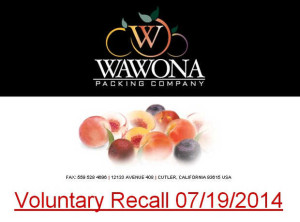Listeria is a pretty common bacteria in the soil and environment. Before Jensen Farms lots of food safety folks would not have been surprised to find some Listeria spp on the outside of a cantaloupe (it’s grown in soil, packed on lines that aren’t easy to clean and sanitize).
But handling practices, water and sanitation tragically magnified a few cells of Listeria monocytogenes into over thirty deaths. 
Having hundreds of thousands of Lm cells (and reaching the median infectious dose) is a public health risk. Consuming a few cells may not be.
Three years later, the result has been that many food service and retail buyers require a regimen of sampling for fresh produce including, for Listeria species, on various products. If it’s found on the product, there’s going to be a recall. And while it might not be a risk-based reaction, no one (especially the buyers) are taking chances.
Wawona Packing Co of California recalled conventional and organic varieties of yellow peaches and nectarines, white peaches and nectarines, plums and pluots yesterday. Wawona has Trader Joe’s and Costco and BJ listed as buyers. Wegman’s has followed by recalling baked products (cakes pies, etc.) they made with the tree fruit.
